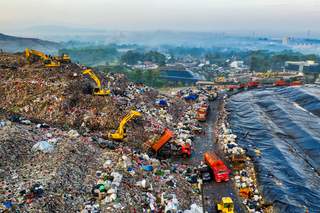
© Pexels/Tom Fisk
Packaging plays a major role in the modern circular economy
Packaging plays a major role in our economic life and the everyday lives of consumers. It is essential for the transport, storage, protection and preservation of countless products. The amount of packaging waste is therefore large. In 2018, 78 million tons of packaging waste were generated in the EU. To protect the environment and human health, it is therefore essential that this waste is managed in a clean and sustainable way. But it is not just about waste management: Like all other wastes, packaging can also be used as raw materials in a developing circular economy
New focus on packaging
The clean management of packaging waste has been an important political issue for decades. A first important step was taken with the introduction of the dual waste management systems in Germany in 1991 ("Green Dot"). At the European level, the adoption of the Packaging and Packaging Waste Directive in 1994 enabled the framework for waste management which is in line with the internal market. Since then, the EU member states have introduced, and respectively further developed waste management systems. The focus is increasingly on the recycling of packaging waste to achieve the aforementioned goal of returning packaging waste to the economic cycle.
Recycling rates vary widely across the EU
In Germany, the privately organised system of packaging waste management includes collection, sorting and recycling/recovery. It achieves high collection and recovery rates. However, the situation in the various EU member states is quite different. While about 68% of packaging is recycled in Germany, Belgium, and the Netherlands, for example, achieve about 78%. Other countries are much lower, in some cases below 50%.
Member States also differ considerably in terms of the amount of packaging waste. For example, whilst Germany reached a packaging waste generation per capita of more than 215kg in 2020, this value remained below 85kg in Croatia and Bulgaria. Overall, the Commission expects a further increase in waste generation to up to 104 million tons by 2040.
EU Commission focuses on more waste prevention and recycling
On 30 November 2022, the Commission therefore presented a new proposal for a regulation on packaging and packaging waste. The new regulation shall replace the previous Packaging Directive and achieve several goals. On the one hand, the prevention of packaging waste is to be given greater priority. Furthermore, by 2030 all packaging should be able to be recycled in an economically viable manner. Finally, the Commission aims to increase the use of recycled plastics in packaging to enable higher-quality recycling in the sense of a modern circular economy.
The most important measures include:
- Packaging waste reduction targets and targets on mandatory reuse for selected groups of packaging.
- Limiting over-packaging and certain forms of so-called unnecessary packaging and supporting reuse and refill schemes.
- Design criteria for recycling to be applied to all packaging.
- Minimum targets for recyclates in plastic packaging.
- Mandatory deposit systems for plastic bottles and aluminium cans.
- Harmonised labelling of packaging and waste containers.
Supporting the circular economy, maintaining successful systems
The German industry strongly supports the goals of the EU initiatives on the circular economy. The common goal is to develop the circular economy into the central building block of industrial value creation. Our economic activities must be geared towards the longest possible use, recycling and reuse of high-quality raw materials and products in circuit systems.
Revised EU provisions for packaging and packaging waste can play an important role in achieving these goals. However, they must ensure that successfully operating packaging waste management systems - such as those in Germany - are maintained. The laws on packaging and its waste management are of great importance for most branches of industry in Germany. They affect material manufacturers (e.g. steel, aluminium, paper/cardboard), manufacturers of packaging products as well as manufacturers who use packaging and waste management companies. Germany's privately organised and generally successful system of packaging waste management is actively supported by the German business community.
The next steps
The European Parliament and the Council will now begin their deliberations on the present Commission proposal. Controversial discussions are to be expected. For example, it will have to be clarified how the sufficient availability of high-quality recyclates for use in packaging can be guaranteed and what contribution the mandatory recyclate targets proposed by the Commission can make. Furthermore, it will have to be ensured that the re-use targets introduced in connection with the waste prevention targets have an actual ecological advantage in concrete cases, for example in deposit and return systems. The extension of product and marketing bans is also likely to be met with criticism. Finally, the new legal form of a regulation, instead of a directive, will considerably limit the leeway of member states in the design of packaging waste management systems. It remains to be seen whether this will find sufficient acceptance in the Council of Ministers.



